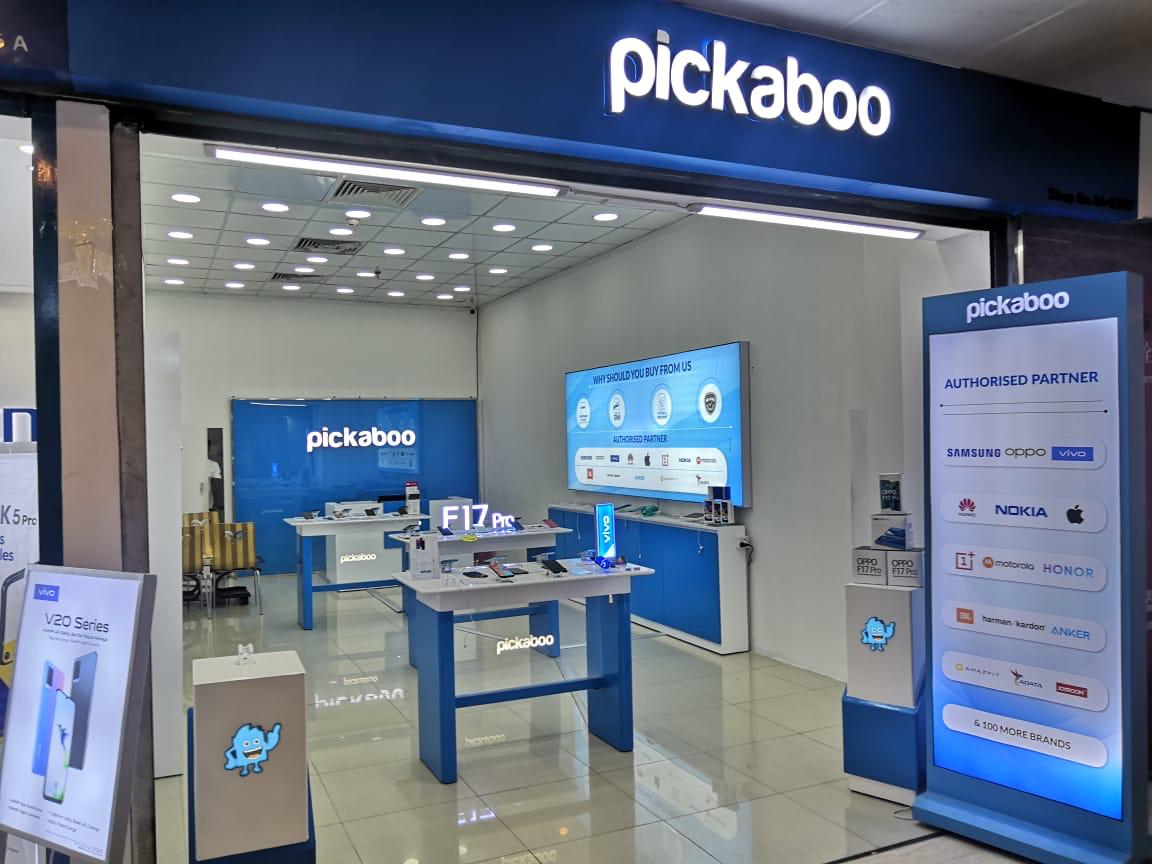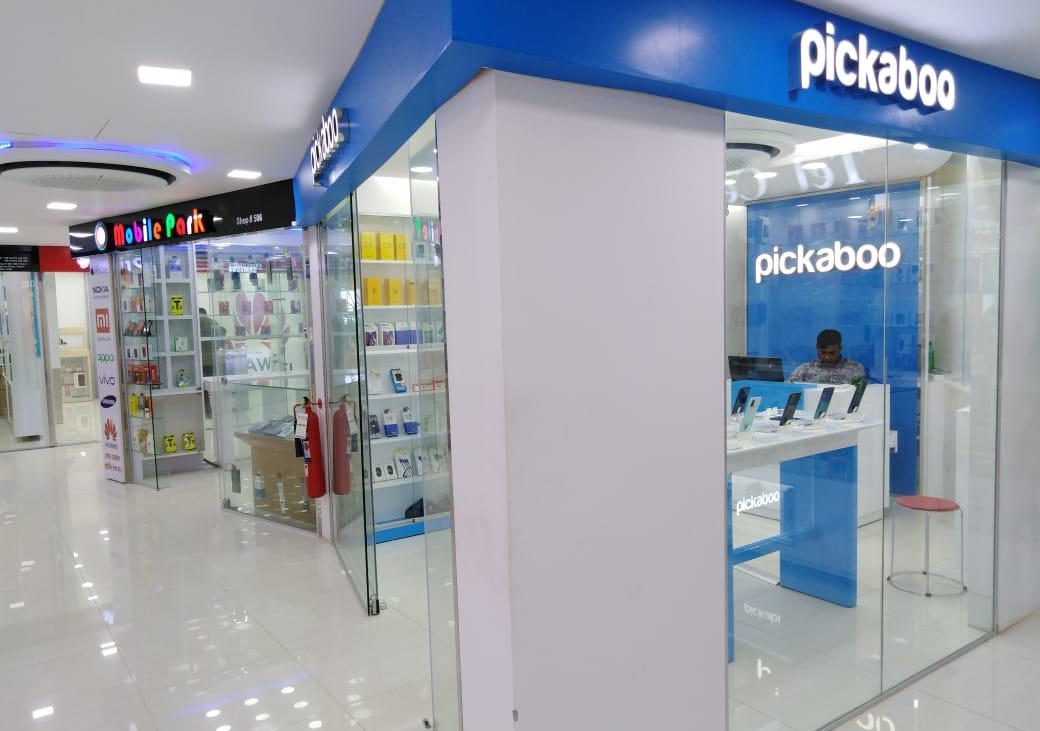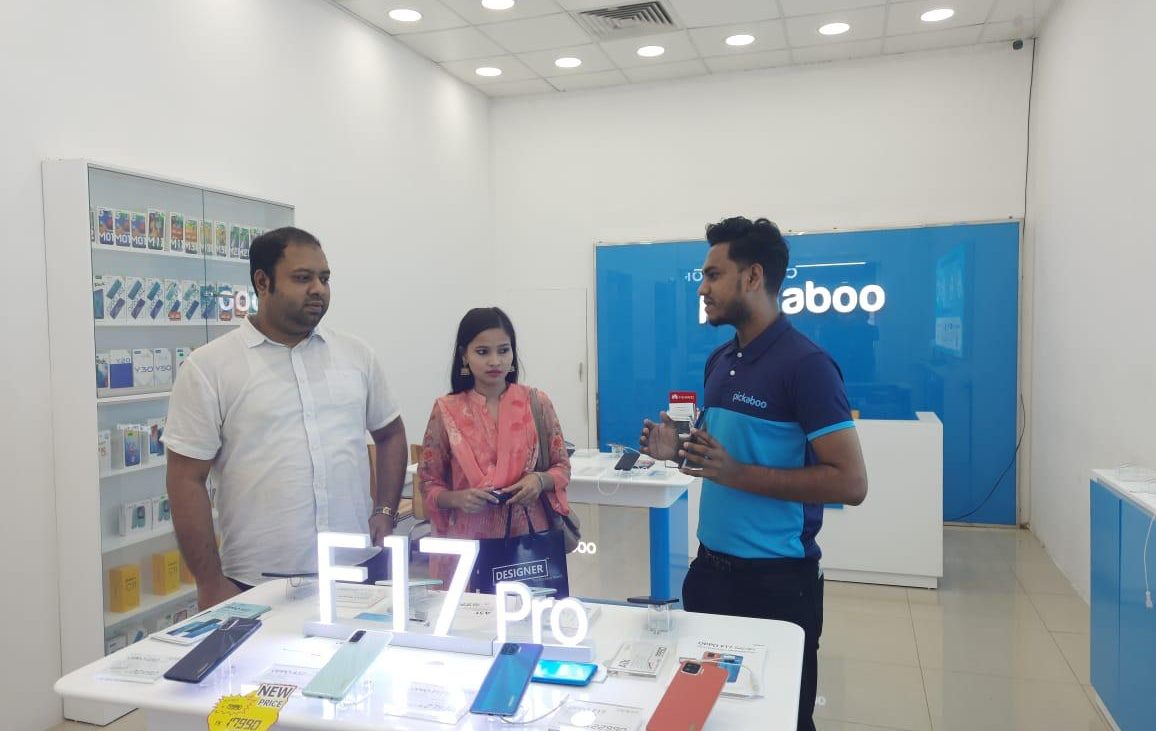
Pickaboo, one of the leading ecommerce players in Dhaka, has made a successful foray into physical retail. In the first quarter of 2020, the company opened nine retail outlets in Dhaka. In 2020, Pickaboo aims to open 20 retail outlets. The company currently has a presence in nine locations in the country. By 2021, Pickaboo aims to have 150+ retail points across the country for mobile and gadgets. Put together with its online commerce operation, Pickaboo aims to become the largest multi-brand omnichannel retail chain for mobile and gadgets in Bangladesh.
Marrying online and offline operation offers several benefits to Pickaboo. It improves competitive moats. Gives access to a larger market opportunity. Eventually, offline outlets can be utilized as delivery hubs for online deliveries that will reduce friction and cost and will allow building a hyper-local ecommerce model improving both speed and cost structure for Pickaboo.
Pickaboo already allows customers to collect their online orders from their nearby Pickaboo outlet for free of charge. When a Pickaboo user places an order online, he/she sees two options: click and collect from a Pickaboo outlet and another is regular delivery collections.
The combined operation strengthens Pickaboo’s overall demand aggregation improving Pickaboo’s leverage with partners such as Samsung and Huawei and thus enabling Pickaboo to offer better benefits to customers.
Pickaboo’s strong online brand image helps Pickaboo in building an online operation both with suppliers and customers. If Pickaboo offline was a separate brand, it would have been an uphill battle for Pickaboo to have similar leverage with partners and build brand awareness with customers within a short time. Since Pickaboo has an existing relationship with partners for its online operation, offline operation helps to take that relationship a notch up. Pickaboo already has a reputation as an ecommerce that cares about customer service that has helped it attract customers offline.
Finally, while offline and online operation works independently, Pickaboo uses the same planning process and resources for both offline and online operations which improves efficiency.
Pickaboo getting into offline retail is not a completely unusual move. Increasingly, digital commerce and offline retail are crossing boundaries. We have seen companies like Amazon in the US and Alibaba in China to invest heavily in physical retail as part of their aggressive expansion plans. In China, ‘O2O' which stands for online to offline, has become a dominant trend and the trend has taken off in entire Southeast Asia in recent times.
In Bangladesh, several online retailers are exploring opportunities at the intersection of online and offline. There are companies like Khaas Food, the safe food brand, that has launched its retail outlets, and then there are companies like Priyoshop and Deligram that are trying to tie respectively a franchisee-led and an agent-led distribution model with digital commerce.
Pickaboo says its model is different from other similar models in Bangladesh. “The fundamental difference between Pickaboo and other players,” says Pickaboo CEO Morin Talukder, “is at the level of integration.” While other players operate in a loosely integrated model, mostly in a commission model in exchange for generating and handling orders in a non-binding relationship, Pickaboo has deeper integration where it has greater control over the offline retail outlet. The company also sees its focus on mobile and gadgets as another strong point of differentiation.
Bangladesh offers an excellent opportunity for integrated omnichannel players because online lacks relative trust, reliability, and reach, and offline lacks data infrastructure, reach, and tech infrastructure to scale. A seamlessly combined operation can potentially offer a lasting competitive advantage to any company that can pull it off. But it is unlikely to be easy to accomplish.
In this article, my ambition is to give you a peek inside Pickaboo’s O2O strategy tying together offline and online operations of Pickaboo and how they operate together. I want to do it in the following way:

Pickaboo's inaugural retail store was launched on Feb 5, 2020, in Bashundhara Shopping Mall, Dhaka. Pickaboo stores are exclusively for mobile phones and gadgets. The company says it plans to open 1500 offline stores in the country’s divisional and major district-level cities by the end of 2021.
In a recent interview with Future Startup, Pickaboo CEO Morin Talukder told us that the company is quite surprised by the response it has been receiving in retail. “We have received an overwhelming response from the customers and have become one of the top seller stores in every shopping center we are in now. In Jamuna Future Park, where few shops usually make a profit and where everyone was warning us before taking a shop that you can't make a profit there, we have been able to make a profit. So we are making serious headway and super excited about the future.” Pickaboo has since launched three outlets taking the total number to four.
How Pickaboo retail works
Pickaboo’s offline operation works independently of its online operation. There are some underlying connections and operational synergies. But operation-wise, both operations work independently.
Pickaboo stores are full-fledged multi-brand offline retail stores for mobile phones and gadgets. These are not what some ecommerce companies have been trying to do: putting a tab in offline shops where people can order online and get the orders delivered after a few days. Pickaboo stores are like every other retail store with in-store product stocks and everything. People can buy products on the spot, right away.
Pickaboo has developed a unique franchise model for its offline operation. It works with retail entrepreneurs to set up these retail stores where both the entrepreneur and Pickaboo invest jointly. “We work with small retail entrepreneurs,” says Mr. Morin. “We provide shop design support to interior design to product and services design support to these shops.” Pickaboo maintains greater control over how these shops are designed and operated. In every outlet, Pickaboo puts a manager who manages the entire operation. Several other employees take care of the smooth running of the shop. The model is similar to what mobile phone brands such as Samsung or Huawei do with franchise shops in terms of putting their brand representatives. Pickaboo outlets maintain a uniform design and experience and put a lot of importance on ensuring superior customer experience.
The outlets are designed to ensure an excellent customer experience. In every Pickaboo shop, the company has a QA manager to look after the quality. Every customer who shops from a Pickaboo outlet receives a call afterward through which Pickaboo collects customer feedback. There are monitoring systems in place to review various interactions with customers. The sales representatives in the shop are trained to help customers with usage and other issues.
Working with small retail entrepreneurs
Retail is expensive. Management is complex and challenging. Pickaboo is using a semi-franchisee model to execute its retail strategy that cuts both ways. Instead of investing all the capital by itself, Pickaboo is working with retail entrepreneurs who already have retail operations or are interested in a retail business to create the outlets. In the first two shops, Pickaboo has collaborated with two independent entrepreneurs. “Our model is not that we are only creating a shop. We are creating and empowering local entrepreneurs as well,” Mr. Morin says. “Pickaboo outlets are done in collaboration with a partner who manages the shop. We have a profit-sharing model in place.”
Many small entrepreneurs suffer in retail due to competitive pressure. Major mobile phone brands have outlets in every market. People generally prefer to go to brand shops. It is hard to compete for a shop that has no brand value with someone with greater investment and higher brand value. Pickaboo aims to play in this space. The company says, for Pickaboo, it is easier to enter the market because Pickaboo already has brand awareness, thanks to its online presence. Mr. Morin offers an example of the power of the Pickaboo brand: “in less than a month of our launch, we are one of the highest sellers in Bashundhara City. Our brand recognition in the market helps us in attracting people to our shops.”
Pickaboo keeps the franchisee a closed process for now. It works with individual entrepreneurs and then moves forward if everything from vision to values match. The company says it will eventually open up the process to the public in a limited manner. However, the stringent criteria will remain, which the company considers necessary for maintaining the quality.
Multi-brand retail chain for mobile and gadgets
There is an endless number of retail mobile phone outlets across the country. But there is a lack of multi-brand retail shops. Moreover, most of these shops are generic and don't have the brand value that creates a deficiency of trust. “The challenge for the non-branded shops is that people don't trust them,” says Mr. Morin. “When we moved into this space, we could easily leverage our online reputation for excellent customer service.”
Pickaboo sees these stores as yet another sales point for Pickaboo similar to its online operation.

Pickaboo sees a gap in the market in the lack of credible multi-brand retail outlets for mobile phones and gadgets in Bangladesh. There is no shortage of retail shops for mobile and gadgets. But few have a strong brand image that elicits trust in the market. And none that has an online operation at scale.
The mobile handset market, combined with gadgets and accessories, is a BDT 16,000 crore market in Bangladesh and growing. While mobile handsets and gadgets are one of the most popular categories in ecommerce, 99% of the mobile handset market remains offline. While the coronavirus pandemic has given a momentary surge to online commerce, a larger number of consumers remain comfortable trusting offline retails shops over online sellers.
Multi-brand outlets allow customers to experience products of different companies under one roof which is not the case with single-brand shops where you can experience products of only one company. Working with multiple brands means your operating cost comes down compared to those who are running a single brand shop and your resources are better utilized. Similarly, the offline market is not as discount-driven as online. It means you can play with customer service and product quality where Pickaboo has years of experience.
Overall, offline offers a big opportunity. “The space is empty and there is a big opportunity if one can play it right,” Mr. Morin says.
Pickaboo sees two opportunities. Building a multi-brand retail chain for mobile and gadgets and eventually expanding to other products. And building an integrated online and offline operation thus building a strong omnichannel operation.
An integrated omnichannel operation can offer significant growth opportunities as well as a competitive advantage to anyone who can build it. Pickaboo sees certain advantages that can help it build a scalable business offline and marry both offline and online operations to achieve a long-term advantage.
Offline retail operation offers several structural advantages to Pickaboo because of its online-offline play. Pickaboo can drive a bigger volume for its brand partners through its online and offline operations. This means it gets priority when it comes to getting the latest products from brands ahead of everyone else giving it a competitive advantage that is not accessible to other retail outlets.
Finally, an integrated offline-online operation opens many new opportunities for Pickaboo to explore including playing with data to cross-promotion to using the offline stores as delivery and service points and many more.
The offline retail world remains largely unorganized, Pickaboo aims to bring order, thus positioning itself as the leader in the organized retail for mobile and gadgets. While a successful offline retail play will bring immense benefits for Pickaboo, it is not going to be easy to pull off a successful offline play.
Pickaboo enjoys a number of benefits when it comes to offline retail. Since its launch in 2016, the company has been able to build a brand that people trust, which it plans to take advantage of in building its offline operation.
Similarly, Pickaboo is not the first company trying to build an omnichannel business in the mobile and gadget space. It has successful examples before it in other markets such as Carphone Warehouse in the UK that has built a large business in the vertical based on an ingenious online-offline playbook. A growing number of ecommerce players starting from Alibaba to Amazon to local Khaas Food and Styline have been moving into offline retail in search of expansion and stronger competitive moats.
Mr. Morin says that a synergetic online-offline operation would benefit both parts of its business. Let’s take a peek into Pickaboo’s offline-online playbook:
1/ Being an online retailer, Pickaboo has one of the most important advantages when it comes to retail – data. The company has access to a huge amount of data on online consumer behavior and now it will have similar access to data regarding offline consumer behavior. Most importantly, Pickaboo understands the importance of data and has been putting data in use to design strategy. Most offline only retailers don’t take data that seriously and very few have a system to capture and analyze data.
To give an example, Pickaboo launches each new product both online and offline at the same time. Since online is much faster than offline, it can see trends ahead of other offline players and use the data to dictate strategic decisions in both worlds. Similarly, since online remains limited in scale in Bangladesh, offline offers richer data regarding market and consumer behavior, which means Pickaboo can use its offline data to inform its online strategy. As a result, Pickaboo can move ahead of any of its competitions and offer products that customers are originally looking for. That is not possible for any player who operates only in one world.
“We can see trends ahead of any offline or online retailer,” Mr. Morin says. Since we collect both offline and online data we can see the performance of different products and take necessary actions when a product underperforms and vice-versa.”
Over the past few years, Pickaboo has invested in technology to build excellent sync between its online and offline operations. When a customer orders something offline that also creates an order in the Pickaboo online system allowing the company to access a greater set of data.
2/ Pickaboo can also use the data to build a robust recommendation engine both online and offline. It can offer suggestions based on what are the best selling products and so on. “We have organized our shop based on functionalities such as a good quality camera”, Mr. Morin says. “Our customer representatives also are trained accordingly: they ask customers their priority and then they show products accordingly.”
3/ Over the years, Pickaboo has been able to build a reputation for authentic products and excellent customer service. It is now taking advantage of that reputation in building its offline business. At the same time, the company has been working hard to replicate the customer-centric approach it developed for its online operation to the world of offline retail. This is an important differentiation because customer service is often an overlooked aspect of retail.
4/ Online reviews are well-known but offline reviews are not. Because there is no way to do reviews offline. But Pickaboo is changing that. The company emails every customer who shops in any of the Pickaboo outlets and requests for reviews. When a customer provides a review, the company updates it both online as shop specific review as well as offline along with the product in print.
5/ The offline world is mostly about sales. Most shops are into selling things and are seldom worried about service and customer retention because you essentially don’t see these data offline. Pickaboo says it is the opposite of what happens in a regular offline world. The company says it pays a lot of attention to retaining its offline customers. The company takes advantage of tech and customer service and works hard to build a lasting relationship with every customer that buys from its outlets. “We are more agile and open to learning,” Mr. Morin says. "We have a system no other offline retail has. We can offer far greater customer service than anyone in the market.”

An integrated offline-online operation will benefit Pickaboo in a number of ways. As mentioned earlier, it expands the potential addressable market size and growth opportunities. It allows Pickaboo to create a hyperlocal ecommerce delivery model. Improves trust and brand image with customers and leverage with partners and helps build stronger competitive moats. Seamless integration between offline and online commerce can result in a superior strategic advantage for Pickaboo.
Increasingly, our online and offline worlds are coming together. In commerce, this is happening even faster. Pickaboo, with its integrated offline-online strategy, puts itself in a position where it can conveniently take advantage of both worlds and complement each other.
